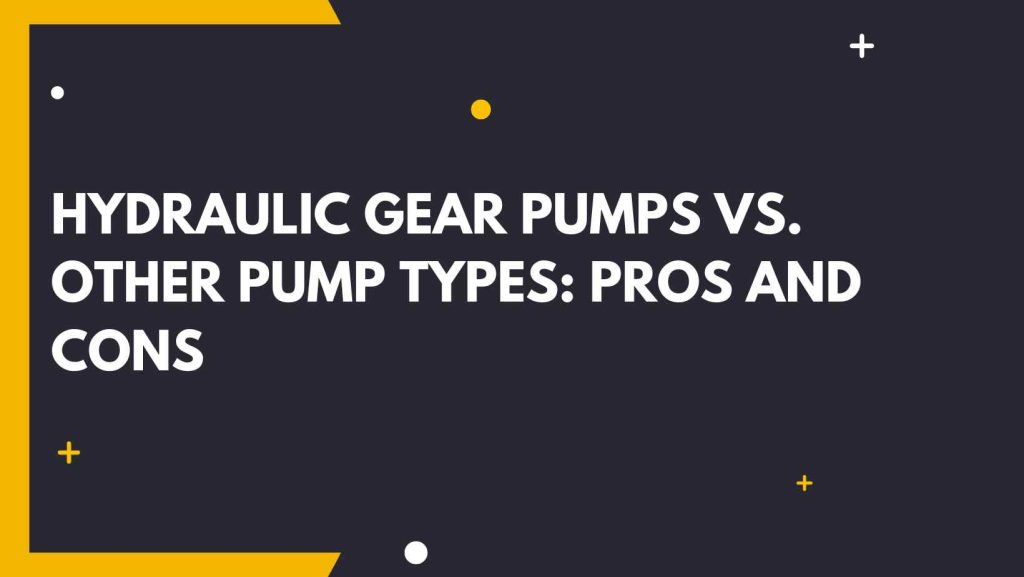- Shop all catagories
- Automated Valves
- Gauges & accessories
- Hydraulics
- Pneumatics
- Water Meters
- Manual Valves
- IBR Certified Boiler Valves
- Non IBR Boiler Valves
- Pipe Fittings & Flanges
Hydraulic Gear Pumps vs. Other Pump Types: Pros and Cons

When it comes to hydraulic systems, the choice of pump can significantly impact performance, efficiency, and reliability. Hydraulic gear pumps are one of several pump types commonly used in these systems. In this blog, we’ll explore hydraulic gear pumps and compare them to other pump types, highlighting the pros and cons of each to help you make an informed decision for your hydraulic application.
Understanding Hydraulic Gear Pumps
Before we delve into the comparison, let’s briefly review hydraulic gear pumps. These pumps are positive displacement pumps that use the meshing of gears to pressurize hydraulic fluid, generating flow. They are known for their simplicity, compactness, and reliability, making them a popular choice in many hydraulic systems.
Comparison with Other Pump Types
-
Hydraulic Gear Pumps vs. Hydraulic Vane Pumps:
-
Pros of Hydraulic Gear Pumps:
- Simplicity: Gear pumps have fewer components, making them easier to manufacture and maintain.
- High Efficiency at High Speeds: They perform well at high rotational speeds, making them suitable for high-speed applications.
- Compact Size: Gear pumps are often more compact than vane pumps, making them ideal for space-constrained installations.
-
Cons of Hydraulic Gear Pumps:
- Lower Efficiency at Low Speeds: Gear pumps may experience efficiency losses at low speeds compared to vane pumps.
- Increased Noise Levels: They can generate more noise, which may be a concern in noise-sensitive environments.
-
-
Hydraulic Gear Pumps vs. Piston Pumps:
-
Pros of Hydraulic Gear Pumps:
- Simplicity and Reliability: Gear pumps have fewer moving parts, reducing the risk of failure.
- Cost-Effective: They are often more cost-effective than piston pumps.
- Suitable for Low to Moderate Pressures: Gear pumps work well in applications with lower pressure requirements.
-
Cons of Hydraulic Gear Pumps:
- Limited High-Pressure Capability: Gear pumps may not be suitable for applications that require very high pressures, where piston pumps excel.
- Less Efficient: Piston pumps tend to be more efficient, especially in high-pressure applications.
-
-
Hydraulic Gear Pumps vs. Screw Pumps:
-
Pros of Hydraulic Gear Pumps:
- Simplicity: Gear pumps have a simpler design compared to screw pumps.
- Reliable: They are known for their reliability in various hydraulic applications.
- Cost-Effective: Gear pumps are typically more budget-friendly than screw pumps.
-
Cons of Hydraulic Gear Pumps:
- Limited High-Pressure Capability: Screw pumps are better suited for high-pressure applications.
- Less Efficient: Screw pumps can be more efficient, particularly in high-pressure, high-flow situations.
-
Choosing the Right Pump for Your Application
Selecting the right pump for your hydraulic system requires careful consideration of your specific application requirements. Here are some key factors to keep in mind:
-
Flow Rate and Pressure: Determine the required flow rate and pressure levels for your application. Different pumps excel in various pressure and flow ranges.
-
Efficiency: Consider the efficiency of the pump, especially if energy efficiency is a priority for your application.
-
Space Constraints: Evaluate the available space for pump installation. Gear pumps are often chosen for their compact design.
-
Budget: Assess your budget and cost constraints. Gear pumps are generally more cost-effective than some other pump types.
-
Noise Levels: Consider noise levels, especially if your hydraulic system operates in a quiet or noise-sensitive environment.
-
Maintenance: Think about maintenance requirements and how accessible the pump will be for servicing.
Conclusion
In the world of hydraulic systems, choosing the right pump type is essential to achieving optimal performance and efficiency. Hydraulic gear pumps offer simplicity, reliability, and cost-effectiveness, making them suitable for various applications. However, it’s crucial to weigh their pros and cons against the specific requirements of your system. By carefully considering factors such as flow rate, pressure, efficiency, space constraints, budget, and noise levels, you can make an informed decision and ensure that your hydraulic system operates smoothly and efficiently.







